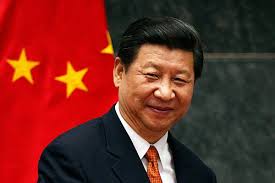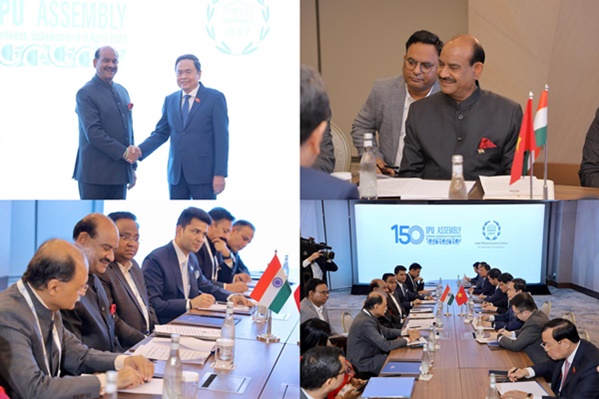Chinese President Xi set to sign USD 46 bn deal on Pak visit
Mon 20 Apr 2015

Islamabad: Chinese President Xi Jinping will arrive here today on his first official visit to Pakistan where he is expected to sign a landmark agreement for an economic corridor worth USD 46 billion that will stabilise Pakistan's cash-strapped economy and expand the Communist giant's influence in India's neighbourhood.
The China-Pakistan Economic Corridor (CPEC) will link China's underdeveloped far-western region to Pakistan's Gwadar deep-sea port on the Arabian Sea via PoK through a massive and complex network of roads, railways, business zones, energy schemes and pipelines.
A fleet of eight JF-17 Thunder fighter jets - jointly made by the two countries - will escort the Chinese president once his plane enters Pakistani airspace.
A red-carpet welcome will be accorded to Xi who has chosen Pakistan as his first foreign destination in 2015 after cancelling his previous trips.
Pakistani Development Minister Ahsan Iqbal said that the the total cost of the CPEC is USD 46 billion.
"It is not a single project but includes several projects related to energy generation, infrastructure development and business areas," he said.
The initial focus is on electricity and some of the early harvest projects would be ready in three years and provide about 10,400 MWs of electricity.
Xi will meet his Pakistani counterpart Mamnoon Hussain who will host a lunch in his honour and will also confer Pakistan's highest civilian award - 'Nishan-e-Pakistan' - on the Chinese president.
Prime Minister Nawaz Sharif will have detailed talks with Xi who is also the General-Secretary of the ruling Communist Party of China, and later several agreements will be signed.
Ahsan said that projects with worth up to USD 28 billion were ready and the groundbreaking of some of these agreements will also be performed.
The CPEC is considered as a "game-changer" that is expected to change the economic outlook of Pakistan.
China has decided to go ahead with the ambitious project despite serious security concern in its restive Muslim- dominated Xinjiang as well as the Taliban threat in Pakistan. The corridor, regarded as the biggest connectivity project between the two countries after Karakoram highway built in 1979, is a centrepiece of China's ambitions to shorten the route for its energy imports from the Middle East.
China has played down India's concerns on the 3,000-km corridor that passes through Pakistan-occupied Kashmir (PoK), saying that it is a commercial project. A defence agreement worth USD 4-5 billion to provide eight latest submarines is also expected to be signed, more than doubling Pakistan's fleet.
The
submarines would help enhance Pakistan's naval power, a move that could raise India's concern.
submarines would help enhance Pakistan's naval power, a move that could raise India's concern.
Xi will also perform the ground-breaking ceremony of several infrastructure projects, including a USD 44 million cross border fibre optic data communication system project, a digital terrestrial multimedia broadcast pilot project at Murree, USD 1.4 billion Orange Line Mass Transit project in Lahore and a cultural centre in Islamabad.
In addition, he will also inaugurate a small and medium hydro research centre and the Pak-China FM radio channel, the 720 MW Karot hydropower project, a 200 MW wind power project and the 900 MW Zeonergy Solar Power Project Bahawalpur.
Other projects including construction of USD 2.6 billion Multan-Sukkur section of the Karachi-Lahore Motorway, USD 920 million Thakot-Havelian section of Karakoram Highway Phase-II, USD 230 million Gwadar Eastbay Expressway and USD 140 million Gwadar International Airport project will also be signed.
Four key projects to create an operational connection between China's eastern provinces and Gwadar Port will be inked. A land lease deed for Gwadar Port and Gwadar Free Zone will be signed between China Overseas Port Holding Company and Gwadar Port Authority. A framework agreement between Pakistan and China for Gwadar-Nawabshah gas pipeline and Gwadar LNG terminal will be inked as well.
Majority of agreements will be signed in the energy sector and China will extend loans for projects expected to install 7,250 MW of power generation capacity in Pakistan, in addition to two coal-mining projects at Thar.
China also wants to develop a commodity exchange facility at Gwadar and is asking Pakistan to provide land for the projects. Another project for a massive investment park in Balochistan is also under consideration.
"These projects will transform coastal city of Gwadar into a modern international city with all facilities," an official said.
Pakistan also plans to create a 10,000-strong force to provide security to Chinese workers and experts. As the two sides increase cooperation, they are also negotiating an agreement for exchange of prisoners.
The Foreign Office said Xi will be accompanied by a large delegation, including First Lady Peng Liyuan, ministers, high-level functionaries of the Communist Party and senior government officials. CEOs from a wide spectrum of Chinese business houses would also form part of the delegation.
Xi's trip to Pakistan was put off last September when he visited the Maldives, Sri Lanka and India and later he skipped the March 23 Pakistan National military parade where he was reportedly invited to be the chief guest.
No Comments For This Post, Be first to write a Comment.
Most viewed from Specials
Most viewed from World
AIMIM News
Latest Urdu News
Most Viewed
May 26, 2020
Do you think Canada-India relations will improve under New PM Mark Carney?
Latest Videos View All
Like Us
Home
About Us
Advertise With Us
All Polls
Epaper Archives
Privacy Policy
Contact Us
Download Etemaad App
© 2025 Etemaad Daily News, All Rights Reserved.






















.jpg)
.jpg)
.jpg)

















